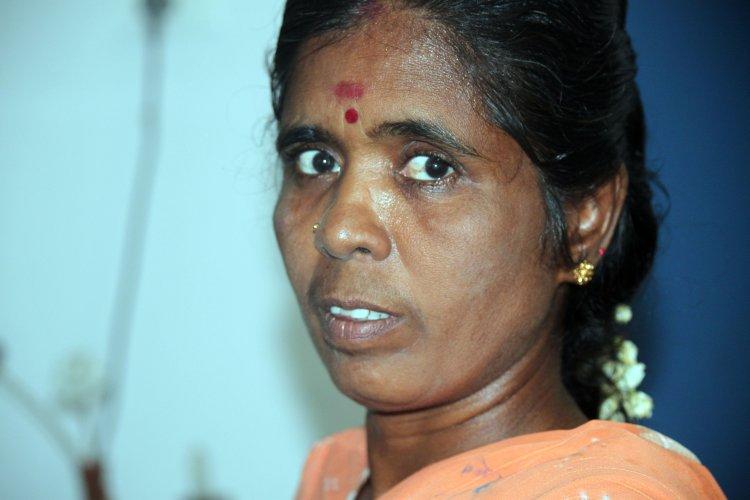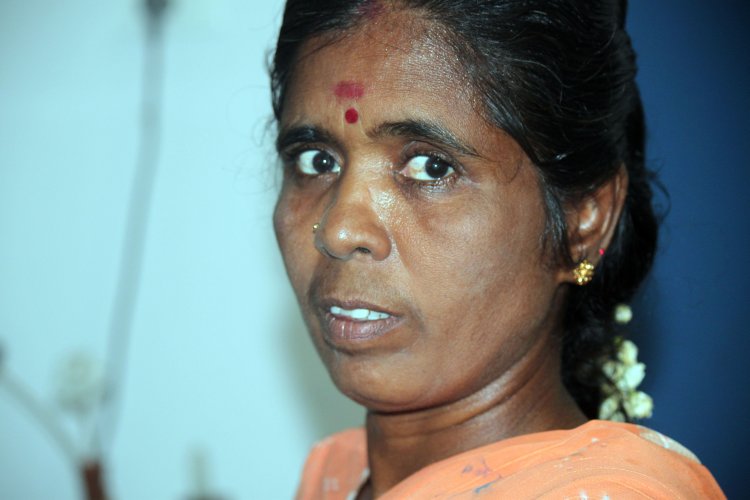PUDUCHERRY, India—Despite the scenic beauty and safety of village life in India, when there is no income, no money to buy food for famished children, and a debt-laden alcoholic or ill husband, many rural women have no choice but to migrate to cities.
Unskilled and vulnerable, most of these migrant women land in domestic work or the construction sector, joining millions of other migrants in India’s sprawling urban slums—a sign of India’s rapidly growing informal economy over the past several decades.
Forty-year-old Bhubneshvari migrated some 30 miles from her village of Tirukovilur in Tamil Nadu State to Puducherry city more than a decade ago due to poverty.
“My father was the only one looking after me and my son. My husband never looked after us. He married again three years after he married me. He also took to drinking alcohol and started to beat both me and his other wife. When my father died, I had no option but to move to the city and look for work,” Bhubneshvari says.
Work doesn’t come easily in cities for women like Bhubneshvari as they lack the skills to sustain themselves in a formal market, and are not mentally prepared or supported to seek education to start a career.
Socio-cultural norms still hold that women in India only get social status after they are married. The notion of marriage as life security lurks in the psyche of many parents as they bring up their daughters in rural India. Rather than educating them to be able to be independent, poverty-ridden parents tend to marry their girls off as soon as they find a proper suitor.
This keeps women in many communities economically very ill prepared for the life ahead since they were taught to expect that either their fathers or husbands would take care of them, even if that situation turns out to be mostly antagonistic.
“I studied till 10 standard [10th grade] but my father never let me work. He picked out a groom for me. Before we married, my husband said he worked in a garment export company so my father thought that he would have enough money to look after me. However, I later came to know that he works as a tailor from home and is an alcoholic. I often wonder why I married!” says Bhubneshvari.
Most of these ill-prepared women who migrate to the cities end up in unorganized sectors like domestic work, construction, or as rag pickers and scavengers.
“The only work I could do in the city was domestic work. I started to work in three homes. My work involved washing dishes and clothes and cleaning for which I earned 1,500 rupees ($27) a month,” says Bhubneshvari.
Although cities initially look like the land of opportunity, they soon turn out to be a difficult struggle for survival.
“I live in a mud hut with a tarpaulin sheet roof for which I pay 500 rupees ($9) rent. We have a common open area to have a bath and wash dishes. We use the nearby community toilets for which we have to pay 1 rupee per usage,” explains Bhubneshvari, who often has to struggle to get paid for the extra work she does in the rich households. She sometimes feels that richer people don’t want to pay adequately.
Along with these destitute women, their children also migrate. With poverty persistent, pressure to add to income to the family looms large, so many children dropout of school to work.
“My son doesn’t feel inclined to go to school. He makes 2,000 rupees ($37) loading and unloading snacks and carbonated drinks for shops,” said Bhubneshvari.
The hard life of cities often propels thoughts of saving to return to the village. “My son saved 500 rupees ($9) every month in a money saving scheme and saved about 50,000 ($917) rupees. With another 20,000 rupees ($367) I got by selling my gold necklace, we built a home in the village. However we have to accommodate everyone in it—my husband, his other wife, her son, and my mother-in-law,” Bhubneshvari said.
In Bhubneshvari’s case, she migrated only a short distance so can easily go back to her village at anytime. There are other destitute women who migrate much greater distances in search of work.
Reena, 29, left her village in the Parganas region of West Bengal in eastern India to find work in Jammu in the far north of India, a distance which takes her two nights and three days to cover by train.
Born into abject poverty and never having been to school, Reena says she’s worked her whole life.
“I worked since I remember myself as a child. My parents were very poor and they labored from morning to evening and there was no one to look after me.”
Unlike Bhubneshvari, Reena married by her own choice at the age of 17. A year later, she had to leave in search of work because her husband was contributing nothing toward his wife and new baby.
She migrated 11 years ago to where a few others from her village were already living and got work as a maid because that’s all she knew how to do.
“I’m tired of working and want to settle down back in my village, but I have nothing—no home, no land. I’m working extra hours to save money so that I can buy some land and build a home. I work in eight homes every day and earn 6,000–7,000 rupees ($120–$140) a month. Prices are skyrocketing, I hope I can save enough and buy some land soon,” Reena adds.
Reena’s 12-year-old elder son stopped going to school and there’s nothing much that she can do about it. She doesn’t know about the whereabouts of her husband either.
“I don’t know if he’s alive or dead; I haven’t seen him for the past two years. He used to drink a lot,” she says.
Children who drop out of school under such circumstances are deprived of an education and thus continue the same vicious cycle. And while their mothers work hard from morning to evening, the children are also deprived of the family care every child is entitled to. Moreover, living as a migrant and part of the underclass, also makes them vulnerable to many other harsh conditions both physically and psychologically.
Reena is happy that at least her youngest child is attending school and she counts herself fortunate for other reasons.
“My life is still better. When I think about the lives of many other women who work very hard and get badly beaten by their husbands and live in acute misery, I realize I’m happier!” Reena said.
The Epoch Times publishes in 35 countries and in 19 languages. Subscribe to our e-newsletter.







